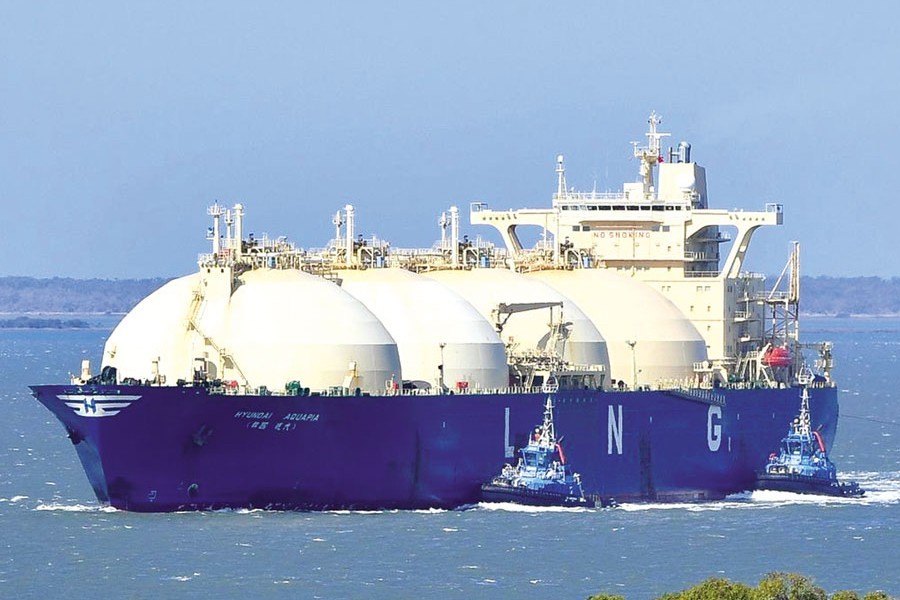Bangladesh will be able to import liquefied natural gas (LNG) from spot market at lower rates if the government purchases the fuel through open-tendering method instead of the existing selective- and limited-tendering process, market insiders and experts said.
Rupantarita Prakritik Gas Company Ltd (RPGCL), a wholly-owned subsidiary of the state-run Petrobangla, currently invited bids from only 16 listed suppliers to purchase LNG from spot market.
But among the 16 suppliers, only a few - numbering half a dozen maximum, submitted bids to supply the expensive fuel to the Petrobangla.
Only three to four listed suppliers are the regular participants in the bidding to supply spot LNG, said sources.
Purchase cost of LNG from spot market could be significantly lower, if the government goes for open tendering to procure the fuel, they added.
Spot market is a public financial market, in which financial instruments or commodities are traded for immediate delivery. Spot market for LNG has developed over the past several years with gluts of LNG output alongside growth of emerging markets for the fuel.
Currently, the Petrobangla has increased LNG import from volatile spot market to overcome the gas crisis, caused by abrupt fall of gas supply from the country's largest producing Bibiyana gas-field last week.
The agency purchased the latest LNG cargo from spot market at around US$36 per million British thermal unit (MMBTU) for April delivery.
Qatar's Qatargas also increased supply of the fuel under term contract by re-scheduling its previous cargo delivery plan for Bangladesh.
Augmented import from both spot market and term suppliers jacked up the country's LNG re-gasification to 892 million cubic feet per day (mmcfd) on Monday, the highest re-gasification capacity from the two operational FSRUs (floating, storage, re-gasification unit).
Bangladesh's current buying prices of LNG from term suppliers hover around $13 per MMBTU, considering the Brent crude price at around $100 per barrel. The country imports five to six LNG cargoes from two long-term suppliers.
The government should select LNG suppliers from spot market following an open and competitive tendering instead of selected tendering method, said Professor M Shamsul Alam, energy adviser of the Consumers Association of Bangladesh (CAB).
If the government picks the suppliers from a shortlist of selected suppliers, the purchase prices of expensive LNG will be much costlier, he added.
The government should select the suppliers either through competitive open tender or through 'Swiss challenge' mechanism, said energy expert Professor M Tamim.
'Swiss challenge' is a form of public procurement, followed in some jurisdictions. It requires a public authority, which has received an unsolicited bid for a public project or for services to be provided to the government, to publish the bid and invite third parties to match or better it.
Otherwise, the selection process will indicate involvement of corruption, added Mr Tamim, who was the special assistant to the chief adviser of a former caretaker government.
If the government fails to ensure competitiveness in public purchases, formation of the Bangladesh Competition Commission (BCC) and spending money for the entity will be useless, said Mr Alam.
Besides, role of the Bangladesh Energy Regulatory Commission (BERC) will remain elusive, if it fails to ensure competitive energy prices for consumers.
Consequently, the government's subsidy in energy sector will also mount further, the CAB leader added.
Officials said the RPGCL has separately inked master sales agreement (MSA) with 16 global suppliers so far to source LNG from spot market.
Bangladesh is importing spot LNG, having a gross heating value ranging 1,025-1,100 Btu per standard cubic feet (scf).
The imported spot LNG is blended with locally produced natural gas, which is sulfur free and sweet gas, before it is delivered to end-users.
Spot suppliers supply the fuel on a delivered ex-ship basis, and the vessel sizes range between 125,000 cubic metres and 220,000 cubic metres.


